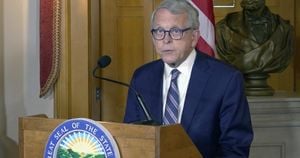World leaders gathered recently at the G20 summit held in the picturesque setting of Rio de Janeiro, Brazil, signifying both unity and division amid global uncertainties. This summit serves as one of the last major opportunities for diplomacy before the anticipated return of Donald Trump to the White House, creating ripples of concern and questions about future international relations.
The gathering brought together heads of state from across the globe, with some leaders exuding camaraderie, speaking with enthusiasm as they posed for the official photo. Notably absent from this moment was U.S. President Joe Biden, who was delayed due to what U.S. officials referred to as "logistical issues". Biden's absence was indicative of his increasingly sidelined status as global dynamics shift, particularly with Trump's looming return.
While the leaders of China, India, and Brazil stood front and center, Biden's absence highlighted the frayed edges of American diplomatic influence. Officials from his administration rushed to explain away the incident, emphasizing, "They took the photo early before all the leaders had arrived." Reports suggested Biden was still engaged in discussions with Canadian Prime Minister Justin Trudeau at the time of the photo op. The sidelining of Biden from such significant photo opportunities raises eyebrows and prompts discussions about the future role of U.S. leadership on the world stage.
The G20 summit is currently seen as the final diplomatic meeting of sorts before Trump enters back onto the political scene. His "America First" policy has many questioning where the U.S. stands on issues like climate change, trade, and international law, as Trump historically favored transactional relationships over multilateral ones. This return of Trump presents new challenges and opportunities for dialogue within the G20 forum, which has been tasked with addressing global economic stability and geopolitics.
Among the key issues on the agenda were urgent topics such as stabilizing the global economy, addressing climate change concerns, and discussing pressing geopolitical conflicts ranging from the Ukraine crisis to tensions within the Middle East. The importance of preserving discussions within the G20 cannot be overstated, especially as the traditional roles of larger organizations like the United Nations seem to wane due to their perceived ineffectiveness and inability to initiate change.
Indeed, with the UN's credibility diminishing—often criticized for failing to reform key structures like the Security Council—the G20 stands out as the last significant forum where global leaders can discuss opposing views without the friction typical of other international organizations. Amid this backdrop, the dynamics within the G20 will likely evolve as power rivalries persist and the geopolitical climate grows complicated.
This summit has unveiled the fragile balance many nations attempt to maintain, with the Global South increasingly turning to alternative alliances with nations like China, which has actively sought to challenge the status quo presented by Western powers. The shift away from traditional U.S. leadership could drive countries toward forming new global avenues for cooperation, particularly within China’s BRICS coalition, which is gaining traction as representatives from Brazil, Russia, India, China, and South Africa pursue more collective goals.
The growing discontent with American leadership and the upswing of nationalist politics within the U.S. has only accelerated discussions around the future of global governance. The leaders of Brazil and India, for example, are positioning themselves not only as economic emergences but also as influential voices against the perceived Western hegemony. This presents both risks and opportunities for dialogue, as multilateral discussions may either yield collaborations or deepen divisions.
During the summit, discussions were not limited to economic hardships and geopolitical conflicts; climate change loomed large as stakeholders grapple with the pressing reality of environmental degradation. The urgency surrounding climate negotiations highlights the stark divisions within the group. Countries espousing different capabilities, interests, and definitions of responsibility can complicate meaningful consensus on environmental initiatives, making it increasingly difficult to agree on timelines and commitments.
One important aspect of this summit is the delicate balancing act required by all nations involved. While leaders may voice their intent to work together, diverging interests can often derail collective action. French President Emmanuel Macron, for example, urged for the continuation of cohesive policies to combat global heating, emphasizing mutual cooperation to prevent economic misery exacerbated by environmental collapse.
Meanwhile, the increasing influence of countries like India and Brazil reflects the transition toward less hierarchical forms of international cooperation, with hopes of creating more equitable systems. The summit is expected to address not just economic issues but the broader political dynamics as well, reshaping what global leadership looks like moving forward.
Although Biden's no-show stirred discussions around the declining influence of the U.S. and set the stage for Trump's return, many leaders remain adamant about finding constructive pathways forward. Secretary-General of the G20 warned leaders about growing fragmentation within international systems, urging nations to avoid unilateral moves and promote stability, exacerbated by economic pressures globally.
Despite these challenges, the G20 summit holds significance as one of the few remaining platforms where divergent views can be presented before powerful voices. The interactions among leaders can lead to breakthroughs or breakdowns, emphasizing the need for cooperation during uncertain times.
World leaders left the meeting with both commitments to tackle pressing issues and awareness of the shifting power dynamics at play. While many remain wary of what Trump's policies and approach to international diplomacy entail, the insistence on continuous dialogue may provide holdover opportunities for progressive steps forward.
For now, only time will tell how the delicate balance among nations will evolve as the world gears up for another political transition with far-reaching consequences. The urgency to maintain open lines of communication within the G20 may well be one of the most prudent steps onto the unmarked paths of international collaboration.



